10 Best Crypto Wallet Apps: Use on iPhone & Android in 2025
- Quick Guide for Beginners: What Is a Crypto Wallet and How Does It Work?
- Best Software Crypto Wallets — Full Analysis (Updated in 2025)
- Quick Comparison Table: Best Crypto Wallet Features
- Best Hardware Crypto Wallets
- How to Set Up a Crypto Wallet — Step-by-Step Guide
- Tips on Choosing the Best Crypto Wallets
- FAQs on the Best Crypto Wallets
- Get the Best Crypto Wallet
Finding the best crypto wallet can be difficult, especially with so many options to choose from. Some of them won’t be compatible with a large number of coins, while others won’t keep your funds protected from scams and hackers.
I tested 45+ of the best software and hardware crypto wallets and shortlisted the very best. I looked at available currencies, ease of use, and security. All the wallets on my list offer clear and simple interfaces, along with solid security features and efficient integrations to maximize your wallet’s potential.
Editor's Note: Transparency is one of our core values at vpnMentor, so you should know we are in the same ownership group as ExpressVPN. However, this does not affect our review process.Short on Time? Here Are the Best Crypto Wallets in 2025
- Binance — The biggest cryptocurrency trading platform in terms of trading volume with over 400 currencies.
- Coinbase — Protected trading with Secure Enclave and more than 240 cryptocurrencies.
- Kraken — Stands out for its strong commitment to security and its wide range of fiat and cryptocurrency pairs.
- Bitget Wallet — Offers seamless integration with the Bitget trading platform, providing you with secure digital asset management.
- MetaMask — A popular choice for Ethereum users with an easy-to-use browser extension and mobile app.
Quick Guide for Beginners: What Is a Crypto Wallet and How Does It Work?
If you're new to the world of cryptocurrencies, understanding crypto wallets is a crucial first step. These digital wallets are essential for anyone looking to buy, store, or trade digital currencies like Bitcoin and Ethereum. Unlike a regular wallet that holds cash, a crypto wallet doesn't store physical currency. Instead, it keeps two types of digital keys: public and private. They help manage your digital currencies securely on the blockchain.
- Public key. Think of it like your home address — a location where others can send you mail, or in this case, cryptocurrencies. It's safe to share with others.
- Private key. This is more like the key to your safe. It's used to approve transactions and must be kept secret at all times to keep your digital money secure.
Types of Crypto Wallets
There are primarily two types of crypto wallets — hardware and software:
- Hardware wallets (cold wallets). These are physical devices that store your keys offline, providing security by being less vulnerable to hacking. They are ideal for long-term storage of large amounts and suitable if security is your primary concern.
- Software wallets (hot wallets). These run on internet-connected devices like computers or smartphones. They offer convenient access and are capable of fast transactions, making them perfect for frequent trading. However, due to their connection to the internet, they carry a higher risk of security breaches. I suggest using these if ease of use and transaction speed are your priorities.
You can further classify these wallets into decentralized (non-custodial) and centralized (custodial) wallets. Each type offers different methods for managing digital assets, with unique benefits and drawbacks regarding security, convenience, and control.
Decentralized wallets (non-custodial):
- Control. You hold your private keys, having complete control over your funds without third-party access.
- Security. You are responsible for your wallet's security, including backups and safeguarding keys, which eliminates risks from external breaches but increases the risk of loss if keys are misplaced.
- Convenience. These wallets might lack some of the user-friendly features and quick transactions provided by centralized services.
Centralized wallets (custodial):
- Ease of use. Hosted by services that offer a smooth, intuitive user experience and direct access to trading and other services, simplifying transactions.
- Security risks. Despite solid security measures, they are prime targets for hackers, and you depend on the platform's security practices.
- Autonomy. Using a custodial wallet means relinquishing control over your keys to a third party, who then has the ability to manage your funds, potentially freezing or accessing them as required by law or policy.
Best Software Crypto Wallets — Full Analysis (Updated in 2025)
Explore our diverse list of the best software crypto wallets, featuring both centralized and decentralized options to suit various needs and preferences. Whether you're a beginner or a seasoned trader, our guide helps you choose the right wallet by providing you with its key features and detailed insights into its security.
1. Binance
Binance is the largest crypto exchange globally, so you can start a wallet with your choice of over 400 currencies. It supports all the major coins, such as BTC, ETH, XRP, DOT, SOL, ADA, etc., along with meme coins like SHIB and DOGE. This exchange also supports many fiat currencies for deposits and withdrawals, including USD, EUR, RUB, TRY, UAH, KZT, INR, and more.
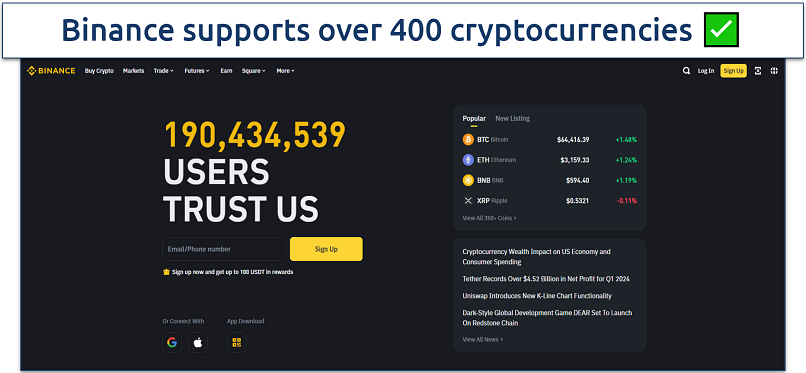 You can trade anywhere with the Binance apps on iOS and Android
You can trade anywhere with the Binance apps on iOS and Android
The wallet is incredibly secure and covered by 2-factor authentication by default. You choose your own PIN codes and phrase-based recovery prompts, much in the same way as traditional online banking, to ensure your wallet can only be accessed by you. There is also the option to whitelist specific addresses, so you never have to worry about accidentally sending crypto to the wrong person.
SegWit (an update to the Bitcoin protocol) speeds up transaction processing times and reduces fees associated with them, as there is less competition for space within each block. It's important to note that while Binance offers comprehensive FAQs and support pages categorized to assist with common issues, customer support responsiveness could be improved.
2. Coinbase
Coinbase is celebrated for its user-friendly interface and rigorous adherence to regulatory standards, including KYC and AML, which enhance security for new entrants to the cryptocurrency market. The platform ensures security with 2-factor authentication and transaction verification via a PIN code sent to your mobile device.
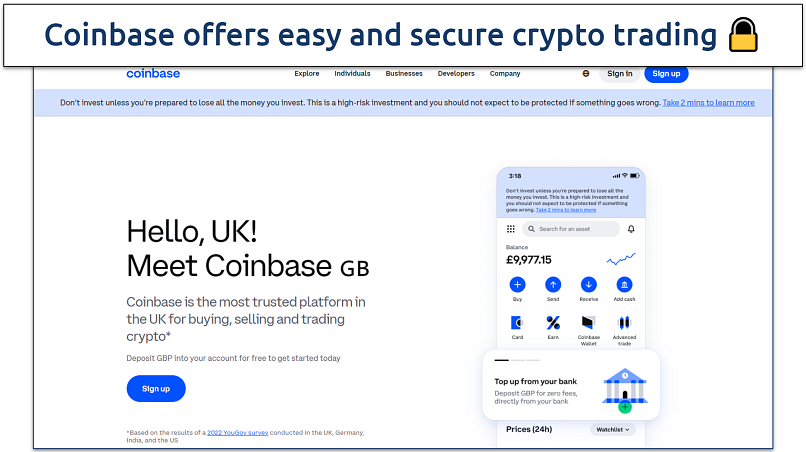 Coinbase also offers various analytical tools, helping you make important decisions
Coinbase also offers various analytical tools, helping you make important decisions
The app provides a full suite of services — wallet, exchange, and merchant solutions — bolstered by advanced security measures such as biometric locks and secure enclave technology, which encrypts data at the CPU level to ensure that only authorized users can access sensitive information.
Coinbase supports over 200 cryptocurrencies, including Bitcoin, Ethereum, and Solana. It offers unique features, like access to DeFi projects. You can also manage digital currencies and Ethereum ERC-20 tokens, participate in airdrops, and leverage integrations for enhanced crypto functionality.
3. Kraken
Kraken stands out as primarily an exchange platform. It offers a robust selection of cryptocurrencies, including major ones like Bitcoin, Ethereum, and Cardano, as well as a variety of stablecoins like US Dollar Coin, Tether, and Dai. It’s particularly suitable for frequent traders or those seeking to mitigate market volatility.
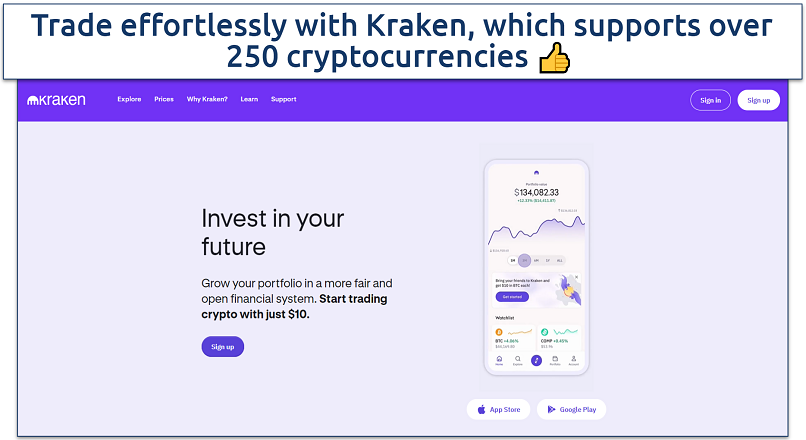 Kraken's mobile apps provide a seamless experience for trading on the go
Kraken's mobile apps provide a seamless experience for trading on the go
Kraken is also known for its stringent security measures. It employs API key permissions, a secure private code system, blocks SMS-based wallet recovery, and features automatic timeouts for inactive sessions. Additionally, its bug bounty program incentivizes the identification and reporting of security vulnerabilities.
While Kraken's standard banking fees are higher, the Kraken Pro option significantly reduces these costs, offering a more competitive fee structure for high-volume traders.
4. Bitget Wallet
Bitget Wallet offers specialized services that cater to futures traders, allowing seamless transitions between spot trading and futures contracts. It comes with robust security features like a multi-tier and multi-cluster system architecture, which enhances stability and safeguards your assets. Bitget also reinforces this protection with 2-factor authentication and provides an optional cold storage feature for funds not needed for immediate trading.
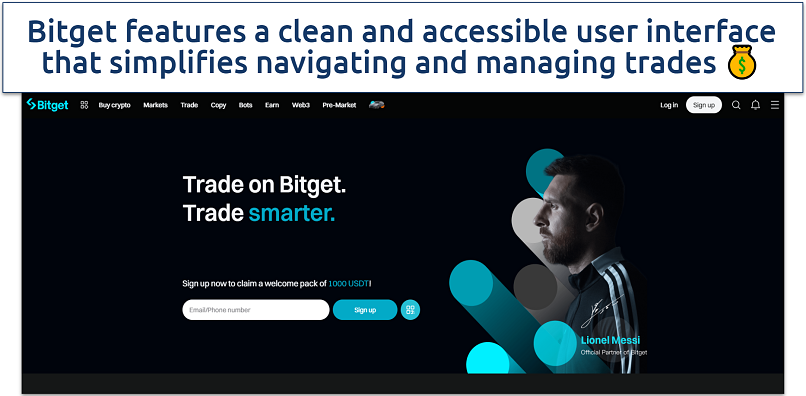 Bitget supports many cryptocurrencies, including major coins and several lesser-known altcoins
Bitget supports many cryptocurrencies, including major coins and several lesser-known altcoins
It includes innovative options like copy trading, where you can mimic the transactions of experienced traders, and integrates with TradingView for advanced charting tools to analyze market trends. However, its emphasis on futures trading means it may not fully cater to those primarily interested in spot trading, potentially limiting its suitability for all types of traders.
5. MetaMask
MetaMask is a popular decentralized crypto wallet known for giving users full control over their private keys and funds. It allows easy management of Ethereum-based assets, including tokens and NFTs, while seamlessly connecting to decentralized applications (dApps) through a browser extension. With MetaMask, users can interact directly with the Ethereum blockchain and explore the world of DeFi, Web3, and blockchain gaming.
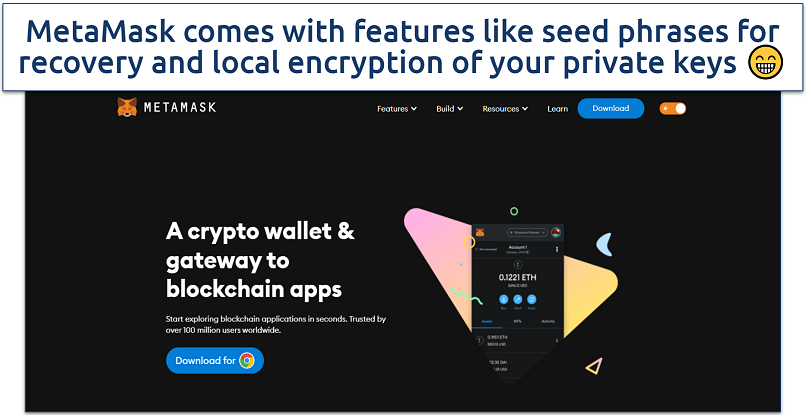 Using it with a hardware wallet can add an extra layer of protection
Using it with a hardware wallet can add an extra layer of protection
Available as a mobile app, MetaMask also supports multiple wallets and custom networks like Binance Smart Chain. However, because users are responsible for their private keys, it can be less secure for those unfamiliar with best security practices.
6. Exodus
Exodus offers a visually appealing interface and seamless user experience, making it a favorite among cryptocurrency newcomers and seasoned investors alike. This wallet excels in providing not only a straightforward entry point for first-time users but also robust functionality for conducting transactions across multiple blockchain networks.
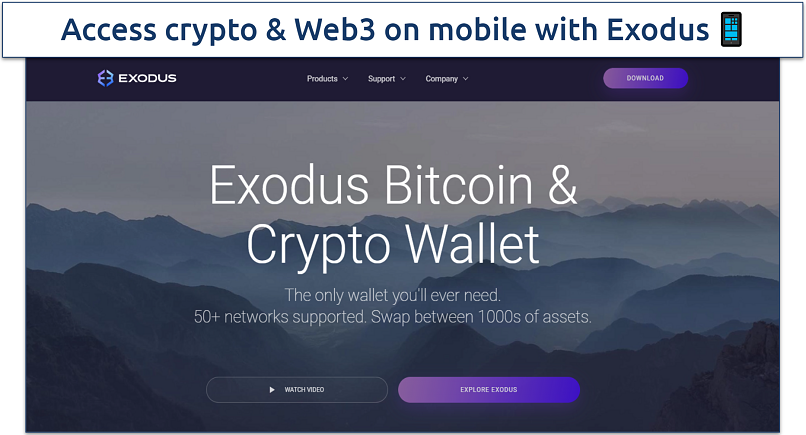 Exodus makes trading crypto accessible and fast
Exodus makes trading crypto accessible and fast
One of Exodus's key features is its integration with several trading features directly within the wallet, letting you exchange cryptocurrencies without needing to transfer them to an external exchange. This built-in exchange feature simplifies the trading process and enhances user convenience. However, the convenience of having an in-wallet exchange comes at the cost of higher transaction fees compared to other platforms.
7. BlueWallet
BlueWallet is a standout crypto wallet focused on Bitcoin and Lightning Network transactions, making it ideal for users who prioritize Bitcoin. Its specialization offers simplicity and powerful features, including support for faster, cheaper Lightning Network payments, perfect for small, everyday transactions.
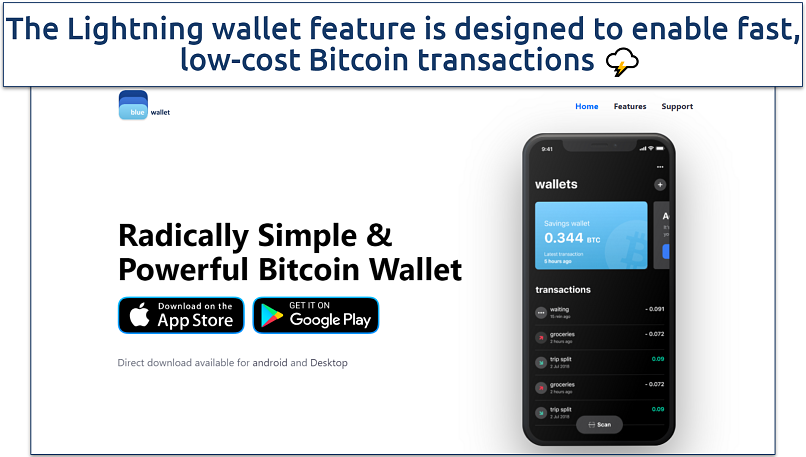 In BlueWallet, the Lightning wallet is non-custodial
In BlueWallet, the Lightning wallet is non-custodial
While BlueWallet ensures strong security with encrypted backups and customizable fees, its exclusive focus on Bitcoin may not suit users seeking a wallet that supports multiple cryptocurrencies.
8. Gemini
Gemini is one of the only exchanges out there to insure customer hot wallets. Like Binance and Coinbase, Gemini offers FDIC insurance for your stablecoin balances, and you can pay an additional fee to cover your crypto assets to the value of $250k. Unlike many other exchanges, Gemini has a reliable customer support team on hand to assist you if you have any issues.
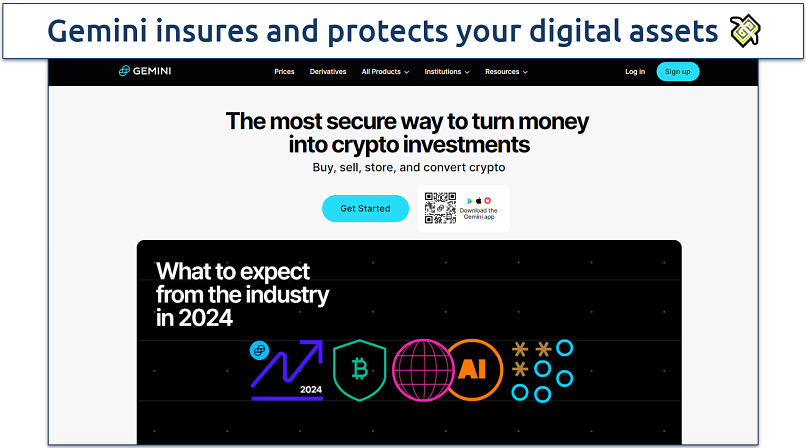 You can trade anywhere with Gemini through its iOS and Android app
You can trade anywhere with Gemini through its iOS and Android app
The wallet supports 60+ currencies, including Bitcoin, Ethereum, and Litecoin, and is available in all 50 US states, making it a good option for users facing US trading restrictions. Gemini's fees are higher than those of many competitors, though it offers modest withdrawal charges and allows up to 10 free withdrawals per month.
9. Trust Wallet
Trust Wallet is a versatile mobile wallet supporting a wide range of cryptocurrencies, including major ones like Bitcoin and Ethereum, along with thousands of tokens across multiple blockchains. This broad support lets you conveniently manage both established and emerging assets from your smartphone.
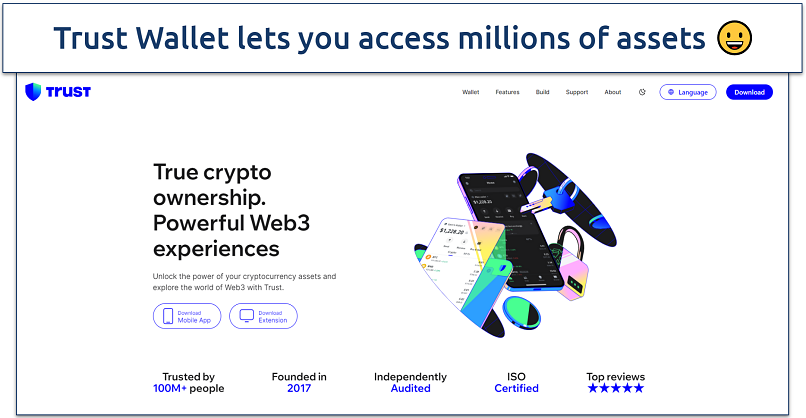 You can work with crypto, manage NFTs, and discover DApps
You can work with crypto, manage NFTs, and discover DApps
The wallet stores your private keys locally on your device, so only you can access your funds. It also includes security features like biometric authentication and an optional recovery system. However, its mobile-only design may be limiting if you prefer desktop management or need more advanced trading features.
10. Crypto.com
Crypto.com Wallet offers a comprehensive solution for trading and securely holding cryptocurrencies. It supports a wide range of assets, from major coins like Bitcoin and Ethereum to smaller altcoins, allowing for a diverse portfolio. The platform also includes financial services like a crypto credit card, earning interest on deposits, and crypto loans, helping you grow your investments.
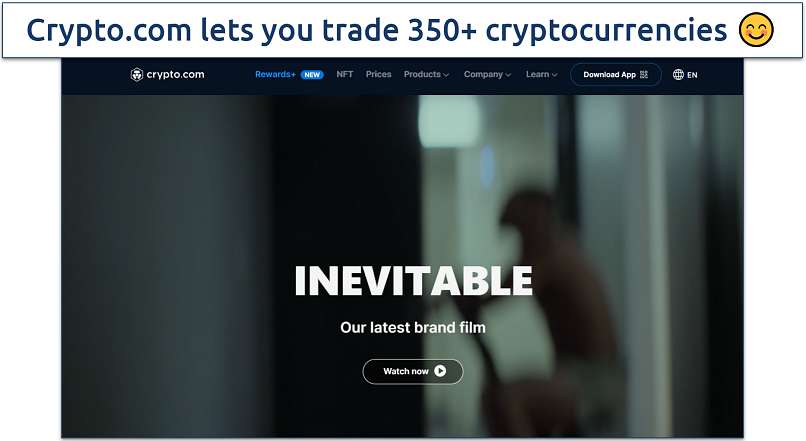 Crypto.com's financial services can help you get a head start on investments
Crypto.com's financial services can help you get a head start on investments
Security is a priority with multi-factor authentication and cold storage, alongside compliance with strict regulatory standards. However, the platform's extensive features can be overwhelming and may require a learning curve, especially for beginners.
Quick Comparison Table: Best Crypto Wallet Features
To choose the best crypto wallets, I took into consideration their number of coins and fiat currencies, fees, security, and whether it has mobile apps.
| Crypto Exchange | Fees | Available Cryptocurrencies | No. of fiat currencies | MobileApp | Centralized or Decentralized? |
| Binance | Trading fees start at 0.1% with potential discounts for using BNB or higher volumes — withdrawal fees vary by network conditions and cryptocurrency | 400+ | 70+ | ✅ (Andoid and iPhone) |
Centralized |
| Coinbase | Transaction fees are 1% for exchanges plus network fees. Buying fees are 3.99% with a card and 1.49% with a bank transfer | 200+ | 60+ | ✅ (Andoid and iPhone) |
Centralized |
| Kraken | Trading fees range from 0.25% to 0.00% for makers and 0.40% to 0.10% for takers based on 30-day volume. Withdrawal fees are specific to the cryptocurrency | 200+ | 8 | ✅ (Andoid and iPhone) |
Centralized |
| Bitget Wallet | 0.1% for spot trades, reduced to 0.08% with BGB token; 0.02% for futures makers and 0.06% for takers | 100+ | 140+ | ✅ (Andoid and iPhone) |
Centralized |
| MetaMask | MetaMask itself does not charge fees, but users pay Ethereum network gas fees for transactions, which vary with network congestion | Primarily supports Ethereum and ERC-20 tokens but is also capable of interacting with other blockchains via custom configurations | 20+ | ✅ (Andoid and iPhone) |
Decentralized |
| Exodus | Exodus doesn't charge any fees, but almost all blockchain transactions will cost gas when you send crypto | 50+ | 30+ | ✅ (Andoid and iPhone) |
Decentralized |
| BlueWallet | BlueWallet doesn’t charge fees for executing transactions. Network or miner fees are still applicable but can be customized before transacting | BlueWallet primarily supports Bitcoin (BTC) and the Lightning Network | 30+ | ✅ (Andoid and iPhone) |
BlueWallet offers both a custodial Lightning wallet (centralized) and a non-custodial Bitcoin wallet (decentralized) |
| Gemini | 0.50% convenience fee on instant orders, 1.49% fee for instant orders over $2000, 0% taker / 0.20% maker fee for ActiveTrader and limit orders | 80+ | 7 | ✅ (Andoid and iPhone) |
Centralized |
| Trust Wallet | For in-app transactions or swaps, the wallet doesn’t charge any fees, although users need to pay the network fee | 70+ | 100+ | ✅ (Andoid and iPhone) |
Decentralized |
| Crypto.com | From 0.0% to 0.75% for maker fees and 0.05% to 0.075% for taker fees | 350+ | 20+ | ✅ (Andoid and iPhone) |
Centralized |
Best Hardware Crypto Wallets
While software wallets offer convenience and ease of access, hardware wallets provide an additional layer of security by keeping your private keys offline. This makes them a more secure option for long-term storage and protection against online threats. Here are some of the best hardware wallets to consider if you want maximum security for your crypto assets:
1. Ledger
Ledger’s Nano series is a leading choice for secure offline storage of private keys, ensuring strong protection against online threats. It supports over 5,000 cryptocurrencies and integrates seamlessly with Ledger Live, allowing users to easily monitor, send, and receive crypto. Ledger is highly versatile and continues to add support for new assets, making it ideal for users with diverse portfolios.
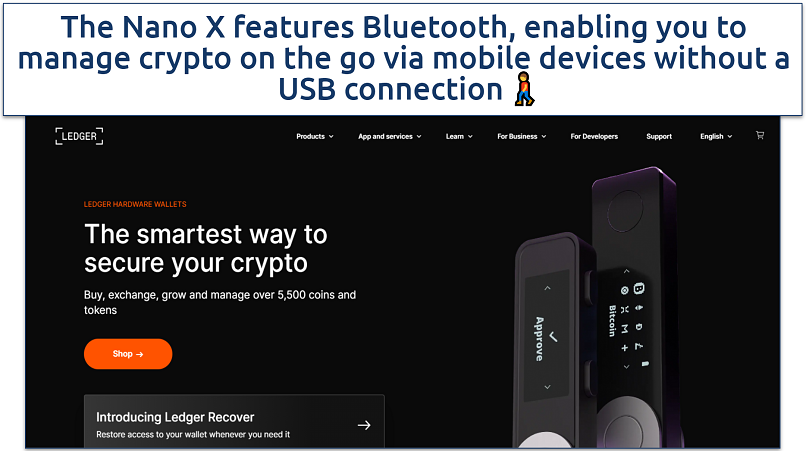 The Secure Element chip keeps your private keys isolated from external threats
The Secure Element chip keeps your private keys isolated from external threats
2. Trezor
Trezor is a highly secure hardware wallet that stores private keys offline and supports hundreds of cryptocurrencies. Its intuitive interface, accessible through Trezor Bridge, ensures an easy setup and management process for both beginners and advanced users. Trezor also features advanced security options, including passphrase protection, making it an excellent choice for safeguarding assets.
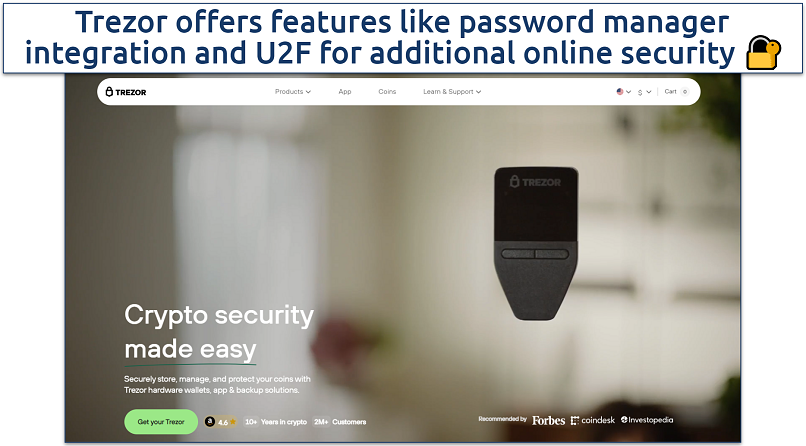 Trezor integrates with third-party platforms like MetaMask
Trezor integrates with third-party platforms like MetaMask
3. KeepKey
KeepKey is a robust hardware wallet that provides offline private key storage while supporting a wide range of cryptocurrencies. It integrates with ShapeShift, enabling direct crypto-to-crypto exchanges within the wallet. Its large display enhances ease of use and offers clear visibility for transactions, making it a secure and convenient solution for managing digital assets.
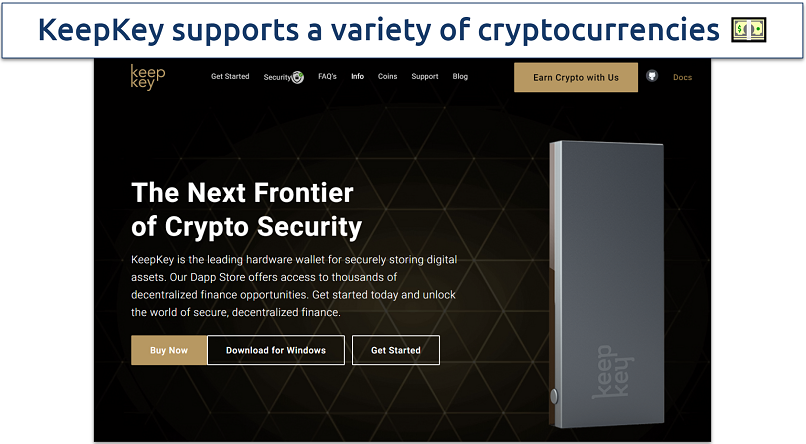 Its larger size might be less convenient for portability
Its larger size might be less convenient for portability
4. SafePal
SafePal delivers secure offline storage for private keys and supports over 10,000 cryptocurrencies and tokens. It integrates with the SafePal app, allowing for easy mobile management of transactions and portfolios. With both hardware and software wallet options, SafePal offers flexibility and robust security, catering to both casual users and crypto enthusiasts.
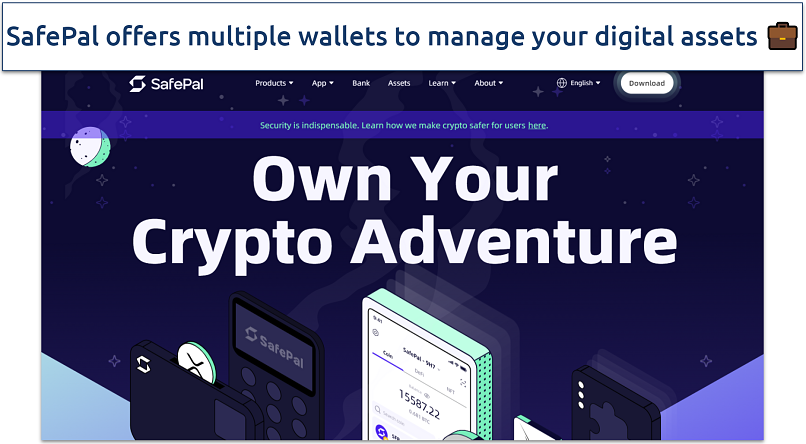 Go beyond crypto and trade other blockchain assets through SafePal
Go beyond crypto and trade other blockchain assets through SafePal
5. Cypherock
Cypherock uses a unique multi-signature security system by splitting private keys into multiple parts, reducing the risk of a single point of failure. It supports a wide range of cryptocurrencies and offers a simple, user-friendly setup while ensuring top-notch security for long-term storage. Cypherock’s innovative design makes it ideal for users seeking the highest level of protection for their digital assets.
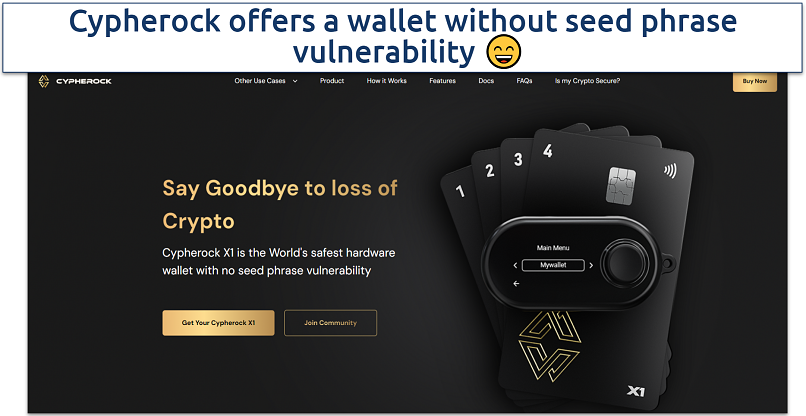 The innovative nature of its security approach might require a steeper learning curve
The innovative nature of its security approach might require a steeper learning curve
How to Set Up a Crypto Wallet — Step-by-Step Guide
Setting up a cryptocurrency wallet usually takes just a few minutes and begins by choosing between a hot wallet (online) and a cold wallet (offline). Follow the steps below to set up your preferred wallet type:
Setting Up a Hot Wallet
Step 1. Download the wallet. For mobile wallets, download from the wallet's official app store or website. For web wallets, double-check the URL to prevent falling prey to phishing sites.
Step 2. Follow the setup instructions to create your wallet. For non-custodial wallets, you will receive a private key in the form of a seed phrase (12 to 24 words). Keep this safe, as losing it means losing access to your crypto. Enable security features like two-factor authentication (2FA) and biometric locks if available.
Step 3. Transfer cryptocurrency from another wallet or purchase directly through the wallet if it supports buying crypto with fiat. For custodial wallets, you may need to complete identity verification.
Setting Up a Cold Wallet
Step 1. Purchase the hardware wallet directly from the manufacturer to avoid tampered devices. Avoid purchasing from unauthorized resellers.
Step 2. Download the necessary software from the hardware wallet's official website. Install it and follow the setup instructions to initialize your device.
Step 3. Transfer crypto from an exchange or another wallet to your new hardware wallet. Some hardware wallets might offer integrated exchange features for trading directly from the device.
Tips on Choosing the Best Crypto Wallets
There are 4 main areas I focus on when I’m choosing a crypto wallet:
- Low fees. When you choose which exchange to keep your wallet with, you should consider both buying and trading fees, as well as banking fees, which can be extensive. So, always check how much it will cost you to actually withdraw your funds from the wallet into your bank account.
- Number of currencies. The more coin options available to you, the more likely you are to excel in crypto trading. When the wallet you pick supports multiple coins, you don’t need to worry about missing the next big tip and can ensure that you’re maximizing your wallet’s potential.
- Immediate availability. Make sure the wallet you want is available in your location before committing. For example, Hawaii has stringent regulations that led some exchanges to stop servicing residents due to high capital requirements.
- Great security. The wallets I’ve chosen use secure 2-factor authentication and other methods to make sure only you can access your funds.
Learn more about crypto with our expert guides:
FAQs on the Best Crypto Wallets
Are crypto wallets safe?
Crypto wallets are usually safe, but their security largely depends on how they are used and managed. Non-custodial wallets, where you control the private keys, offer high security as long as you safely manage and back up your keys. Custodial wallets provided by reputable platforms typically have robust security measures in place, but they come with risks related to third-party control and potential breaches.
Regardless of the type, using strong passwords, enabling two-factor authentication, and being aware of phishing scams are crucial for keeping your crypto wallet secure.
What crypto wallet can I use in Canada and the US?
You can use most top crypto wallets in both Canada and the US. The best wallets, like Trust Wallet, Ledger, and MetaMask, offer global support, strong security features, and user-friendly mobile and desktop apps.
Can I use a crypto wallet on my phone?
Yes, many of the top crypto wallets, such as Binance and Coinbase, have mobile apps with strong security features and support for multiple cryptocurrencies. This allows you to trade and manage your assets securely from your smartphone.
How can I recover my crypto wallet if I lose access?
Recovering your crypto wallet after losing access depends on the type of wallet you use. For non-custodial wallets, recovery typically involves using a previously set up seed phrase — a series of words provided when you first created your wallet. This seed phrase allows you to regain access to your funds on a new device. For custodial wallets, you may need to undergo identity verification processes with the wallet provider to restore access.
Which crypto wallets have the lowest fees?
Crypto wallets themselves typically don't impose transaction fees other than the network fees required by the blockchain. However, some platforms offering wallet services might have lower fees for transactions or exchanges within the same platform. For example, exchanges like Binance and Kraken are known for relatively lower fees, but it's crucial to consider both trading and withdrawal fees.
Are hardware wallets more secure than software wallets?
Yes, hardware wallets are generally more secure than software wallets because they store private keys offline, making them immune to online attacks like hacking or malware. However, both types require good security practices, such as backing up recovery phrases and protecting against physical theft or damage.
What happens if a crypto wallet company goes out of business?
If a crypto wallet company goes out of business, the impact depends on the type of wallet you use. For hardware wallets, as long as you have your private keys or recovery phrases, you can still access your funds using other software or services. For custodial wallets, the ability to recover assets may depend on the company's closure process and regulations. It’s always advisable to use trusted platforms like Coinbase.
How do I track the value of my crypto across different wallets?
You can use portfolio management tools or apps that allow you to add multiple wallets and accounts from various exchanges. These tools aggregate all your crypto holdings into one platform and display real-time values, historical performance, and other financial metrics. Plus, wallets like Binance also have tracking features that help you manage your crypto.
What is a fiat wallet?
A fiat wallet is a digital wallet used to store government-issued currencies, such as USD, EUR, or GBP, instead of cryptocurrencies. You can use fiat wallets to fund purchases of cryptocurrencies or to cash out your crypto holdings into tangible, spendable fiat currency. The best crypto exchanges typically provide fiat wallets to facilitate easy exchange between fiat and crypto within the platform.
Get the Best Crypto Wallet
Choosing the right crypto wallet for you doesn’t have to be tough. I’ve made a list of the best software and hardware wallets that support multiple currencies, have advanced security features, and come with easy-to-use apps.
I recommend these wallets because they have decent trade, exchange, and withdrawal fees. Plus, they offer reliable security features like 2FA, biometric authentication, identity verification, and more to keep your trading experience safe.
Your data is exposed to the websites you visit!
Your IP Address:
18.216.232.138
Your Location:
US, Ohio, Columbus
Your Internet Provider:
The information above can be used to track you, target you for ads, and monitor what you do online.
VPNs can help you hide this information from websites so that you are protected at all times. We recommend ExpressVPN — the #1 VPN out of over 350 providers we've tested. It has military-grade encryption and privacy features that will ensure your digital security, plus — it's currently offering 61% off. Editor's Note: ExpressVPN and this site are in the same ownership group.



Please, comment on how to improve this article. Your feedback matters!